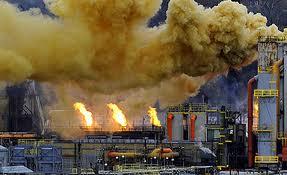Take in a deep breath. Do you know what you’re breathing in? Whereas smoking is a choice, chances are, if you live in or around Pittsburgh, you’re breathing in a whole lot of cancer, heart problem, and asthma- causing particles, all of which you have had no say of breathing in. I hate to break it to you– you’re at risk for all of these things because you’ve lived here for so long.
Don’t worry, though, Pittsburgh only holds the record for the 3rd worst air quality in the United States. And Northgate has the highest asthma rate in the state of Pennsylvania.
Shenango Coke Works on Neville Island, you may have seen it: the big steam cloud coming from across the river, the constant flame that manufactures 350,000 tons of coke per year, and not the soda, the coke used to make steel, especially needed in Pittsburgh’s steel era. Shenango opened in 1962, and has a history of breaking Allegheny County and EPA air quality standards.
According to the Pittsburgh Post-Gazette,“Shenango had one or more air violations on 330 days in a 432-day period during 2012 and 2013. Shenango made federal consent order agreements in 1980, 1993 and 2000, and a county consent order in 2005. Between 1990 and 2010 the company has paid fines of more than $2 million. In 2012, Shenango paid a $1.75 million penalty to settle persistent air and water pollution violations under a joint federal, state and county consent agreement that required the company to reduce the illegal emissions from its 56 coke ovens.”
Coke works emissions are some of the most toxic of all industrial emissions and were correlated to Avalon’s having of the most polluted air in Allegheny County in 2010. Shenango has made upgrades to its equipment after being bought by DTE, but is still not meeting standards. It’s not getting better, in fact, on December 18, the Environmental Protection Agency designated the county as not meeting air quality standards.
At a November 19th meeting, newly formed organization Allegheny County Clean Air Now (ACCAN), met with the Allegheny County Health Department and community members to address their concerns.
I was one of 150 people to attend this meeting, and voiced my opinion. “You know, my uncle died from lung cancer, and he lived here. He never smoked. I sometimes wonder if our air quality is to blame,” I said slowly. “I notice you keep talking about research and monitoring,” I directed to Jim Thompson, the air quality director of ACHD, “Don’t we have enough data? Why don’t we do something?” I was met with a large applause from the audience yet a shocked look on ACHD’s faces. One lady who worked for them said, “Your teachers must be proud for you standing up here.” I nodded, annoyed, for she didn’t answer my question, which, to me, showed she wasn’t listening or caring, just shocked that a high schooler cared what ACHD was (or wasn’t) doing about our health.
This is exactly the reason ACHD came to the meeting, to play public relations. They get so many calls daily from citizens with air complaints, know that they’re getting a bad rap for not doing anything, and now want to make it look like they’re “making an effort” at improving our air quality, while all they’re doing is “looking at their data.” We have enough data. We have done enough research. Now it’s time for action. As the leader of the local Do Something Club, I believe in action, not starting a research project when you already have the facts.
Or if you’re going to do more research, research ways that Shenango can limit the amount of pollution they’re releasing everyday.
Shenango is a for-profit company, and I do not contest their right to earn profit. But at what expense for us, the people who live so close but suffer so deeply from the pollution they expel? Without question, the pollution is affecting our health, but imagine the damage it is doing to the plant workers! They breathe in those toxins all day long. In the age of technology, Why can’t we figure out a way to fix this problem if we aren’t going to shut down the plant – which is the wish of many citizens.
It was worse, though, (hard to believe, I know). In Pittsburgh’s steel making industry, many natives remember the black soot that lined the streets and the days that were dark as night. Now that the steel industry is over, why is there a need to continue to make coke, used to make steel? Money. Shenango makes millions on their profitable company, and it seems that they don’t mind making a large profit at the expense of our health.








